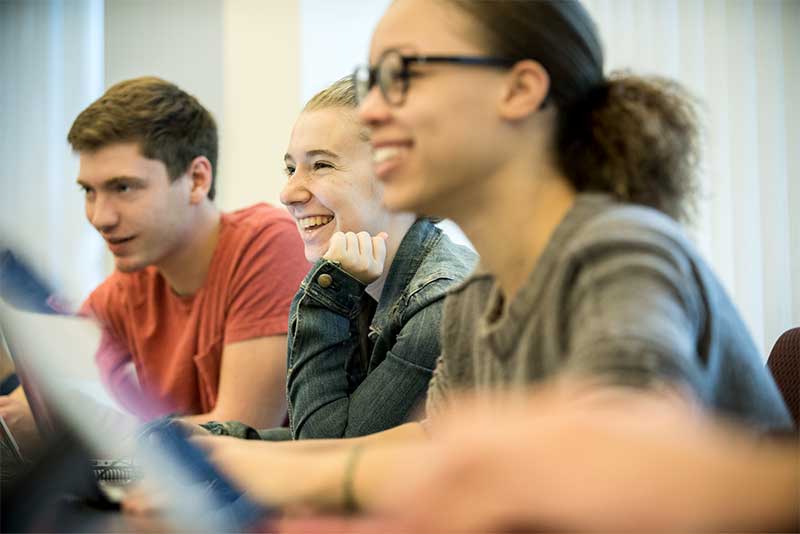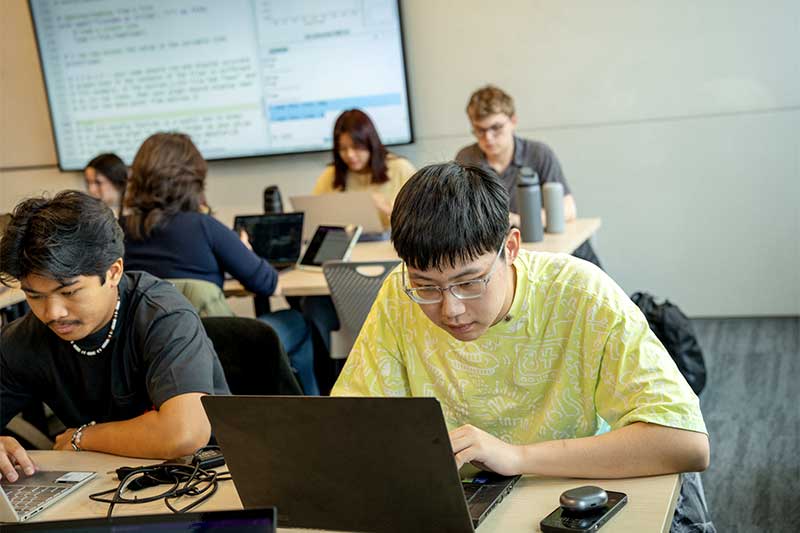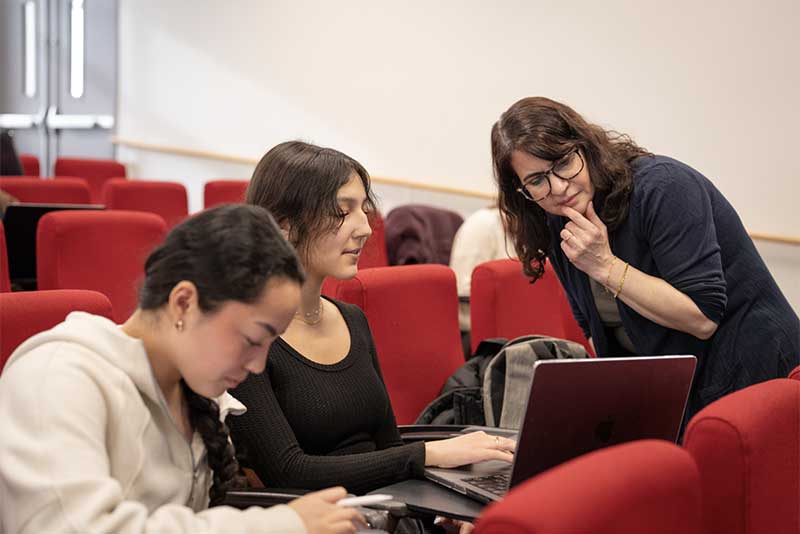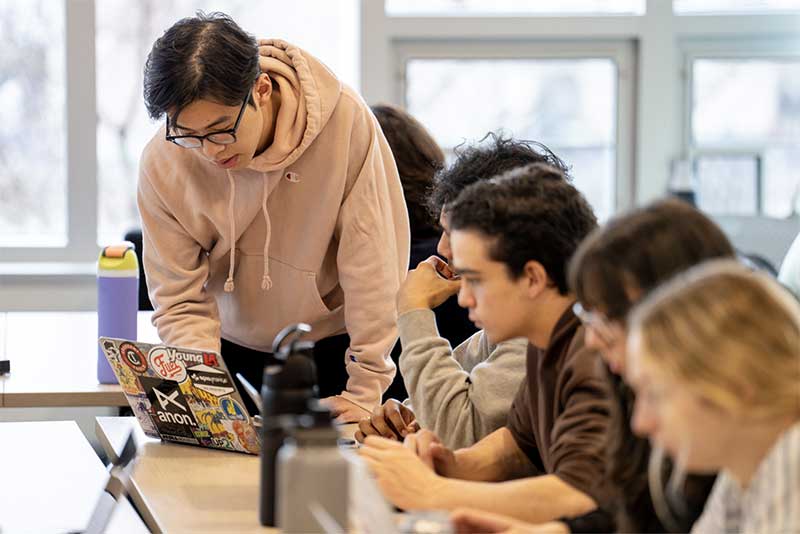Khoury News
Khoury professors lead push to embed ethics throughout intro computing courses
Computing ethics have been a talking point since the field's earliest days. But at Khoury College, ethical consideration is a curricular cog, spurred by professors who blend computing bona fides with humanities experience.

As digital technology increasingly shapes modern life, professors at Khoury College are leading an initiative to embed ethics into fundamental computer science courses.
The college has long championed the integration of ethical training into its undergraduate computer science curriculum, with the most recent initiative weaving ethical thinking and reasoning into myriad introductory assignments. Students are prompted to reflect on how technology will impact society, whether it will further inequalities or remedy them, and how it will be used by humans.
“With the knowledge that our actions as computer scientists can be very impactful comes the responsibility to make those impacts good,” said Kathleen Creel, an assistant professor of philosophy and computer science who teaches “Knowledge in a Digital World.”
The recent ethics push was spurred by Khoury College Dean Elizabeth Mynatt, who joined Northeastern in 2022.
“You can find people in computer engineering and computer ethics back in the ’60s and ’70s talking about ‘Hey, there are implications to what we’re doing and we need to be thinking about that stuff,’” said Vance Ricks, associate teaching professor of philosophy and computer science. “But the dean of a college throwing her political and intellectual energy into making that a hallmark of a curriculum? That’s a fairly recent development.”
At her first Khoury Commencement Celebration speech in 2022, Mynatt also proposed an oath that is introduced to students at matriculation and read aloud at commencement. The oath affirms that students have a special obligation to safety, security, privacy, and to creating equitable opportunities. Faculty, students, and staff collaborated on the creation of the oath and identified ethical tenets from the oath to integrate throughout the curriculum.
How ethics are embedded
“The benefit of integrating ethics into fundamental courses is that students are shown that computer science involves ethical reflection from the very beginning,” said Meica Magnani, assistant teaching professor of philosophy and computer science.
Creel said that the intro course is the perfect time to introduce students to ethics because they learn to be responsible computer scientists at the same time that they’re learning to be computer scientists overall. Daniel Patterson, an assistant teaching professor who also teaches the first course, said questions requiring students to ethically reason are included throughout almost every homework and lab in the class.
For example, one lab students completed in fall 2024 focused on Boston’s now-defunct Street Bump app, which collected accelerometer and GPS data from Bostonians’ smartphones to detect potential potholes and other road issues for the city to fix. Students were asked how socioeconomic factors, such as the distribution of smartphones between wealth classes in the early 2010s, could impact use of the app and subsequent road quality repairs.
“Rather than having the programming task and then separately talking about ethics, we design it so the programming task leads us to ask questions,” Patterson said.
Ricks said privacy is a major ethical consideration for students. For example, one assignment introduced into the first intro course in fall 2024 asked students about the minimal amount of information needed for a neighborhood info app. Although a lot of data on neighborhood residents could be collected, Ricks noted that some information could be unnecessary for the app’s development and harmful to residents.

“It wasn’t that we had a prior answer to the question of how much information the student should collect; it was about having them to stop and reflect on that question,” he said.
Patterson added that ethical thinking in computer science involves two levels. The first is recognizing whether being asked to make a certain technology is harmful; the second is thinking through how a technology can be built to benefit society most.
“Most students will go on to build tools and systems that interact with people. There are very few things we do that don’t have some impact, direct or indirect,” he said. “Making good design decisions that relate to some kind of understanding of the way the field interacts with humanity is really important, and it’s part of the reason we believe strongly that this field can’t exist outside of ethical and moral dimensions.”
Why now?
Northeastern isn’t the first university to embed ethics into its computer science curriculum. Creel, who was previously an embedded ethics fellow at Stanford University, said the work at Stanford was inspired by a similar program started at Harvard in 2017.
So while the idea of embedding ethical thinking into computer science isn’t new, Northeastern’s experiential learning model differentiates the initiative at a time when ethical questions are becoming more complex and consequential.
“For a long time, there was a barrier to thinking about codes of ethics because people said that ethics isn’t really part of computer science itself and ethical questions only arise on the final application side,” Creel said. “What we’ve realized over time is that computer science is an integral part of our society and ethical questions arise throughout the development cycle, beginning with the choice of problem to solve.”

Magnani said increased consciousness about computational ethics could also be attributed to people becoming aware of how much human life has changed in response to new technology.
“For those who are creating those technologies or playing a part in their creation, it becomes really important to have the skills to think through what sort of societal impact this could have on people,” she said.
Feedback and the future
“A 2023 study of ethics in CS at Northeastern suggests that even after one module, students are more likely to think that it’s important to consider moral implications of each choice, that designers need to engage in a range of disciplines, and that computer science decisions are value laden at multiple points,” Creel said.
At the end of the fall 2024 semester, Patterson surveyed 35 students about whether repeatedly answering ethical questions changed the way they thought about CS. Most respondents indicated they became more skilled and comfortable with answering ethical questions throughout the first intro course and that the questions changed the way they thought about the problems they were solving.
Professors also say they notice students are responsive and engaged in the new curriculum. Specifically, Ricks said students sometimes come to him and Magnani to ask how they can get co-ops related to ethics or technology policy.
“That’s really encouraging evidence that this isn’t just a thing that students find entertaining to talk about in a class, but that they actually want to carry it forward into a work or advocacy environment,” Ricks said.

Magnani said she’s found that many computer science students are eager to participate in discussions about ethics with their peers, so there is an effort to organize events to get students together. Professors involved in the initiative are also eager to work cross-institutionally to exchange ideas about ethics in computer science with colleagues at other schools.
“Programming and coding tasks are increasingly automated, but what can’t be automated is the critical thinking and ethical reflection about what we want our technology to do for us,” Magnani said. “Cultivating those skills really sets apart the education here.”
The Khoury Network: Be in the know
Subscribe now to our monthly newsletter for the latest stories and achievements of our students and faculty